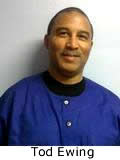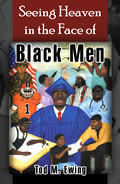 |
||
|
||
| The Real Legacy of Dr. Martin Luther King Jr. | ||
| —Tod Ewing | ||
At the end of August, a memorial on the National Mall in Washington, DC, was dedicated to a man who lived just thirty-nine short years. As we examine the life of Dr. Martin Luther King Jr.—whether objectively or subjectively—it becomes clear that he was one of the most effective leaders of our time, and that through pain, sacrifice, conflict, and struggle, he found a way to lead “the movement” to victory after victory. Surely he had help, and surely he experienced defeat, but ultimately his leadership was triumphant in a most profound sense. In my recent reflections about his life, it occurred to me that if someone had asked Dr. King the same question that the gambler asked the Sundance Kid, he would have given the same answer: “Prayer.” After reading Lewis Baldwin’s book, Never to Leave Us Alone: The Prayer Life of Martin Luther King Jr., I am further convinced he would have answered in that way. Mr. Baldwin confirms that Dr. King saw the Civil Rights Movement as a “spiritual movement” and was convinced that it had to be grounded in “persistent prayer” or the efforts would “prove futile and perhaps even be counterproductive.” Dr. King placed spiritual transformation at the core of every action he took and placed prayer at the center of that transformation. He viewed prayer as the “essential ingredient” for uniting mind, heart, spirit, and soul and saw this as a “precondition for vibrant and successful ministry and mission.” He saw the power of prayer as having a unique role in “any serious and legitimate effort to achieve social transformation.” He insisted, for example, that all decisions made by the Montgomery Improvement Association, the organization that guided the famous bus boycott, be “prayed over” before implementing them into “practical action.” He relied on prayer to turn his own fears into “vitality and feelings of triumph.” At one point, in the early years of his leadership, it was prayer that he drew upon when he found himself “obsessed by feelings of inadequacy” and “anxiety” just before delivering what he called “the most decisive speech of his life.” This speech was particularly challenging because he knew it had to be “militant enough to arouse Black people” to action yet “moderate enough” to ensure “their fervor” stayed “within controllable” bounds that would result in the use of peaceful methods. And it was prayer that allowed Dr. King to face both racist institutions and individuals with unflinching resolve and what he called “a demanding love.” And how this preeminent leader of the “spiritual movement” helped change the world! Yet we continue to refer to him as a civil rights leader while only superficially addressing the profundity, depth, and discipline of the spirituality that defined him. Surely the time is ripe to examine his practical application of spirituality as the foundation for social change, specifically as it relates to issues of race and racism. Surely the time is ripe to examine the manner in which he lifted himself above the fray, above pettiness, above expediency, above enmity, and the way he sustained a transforming energy that “lifted all boats”—an energy we resonate with every time we hear him speak. Though we might admire Dr. King’s spiritual approach to his own transformation and to the real problems facing humanity, many of us fail to consider this approach for ourselves. I contend that if we are serious about advancing the legacy of Dr. King or learning from his leadership, we will make the decision to choose it for ourselves. As Dr. King’s life demonstrated, spirituality is not a magic bullet; it requires daily discipline. Yet learning to apply it to our ongoing struggle for racial unity and justice and to other social issues may be the greatest revolution of all. Together, let us begin. It worked for him and it can work for the rest of us.
Tod Ewing, M. Div., Institute of Self-Transcendence, Atlanta, Georgia. Author of Seeing Heaven in the Face of Black Men. To learn more about Tod Ewing, visit www.heaveninthefaceofblackmen.com.
|
||
| Don't miss another copy of Science of Mind magazine. |
|
 Movies can be great teachers. Particular phrases or scenes often stay with us long after hearing or seeing them, providing meaning or application beyond what was intended. An early scene in the light-hearted classic Butch Cassidy and the Sundance Kid is a case in point. In that scene, the Sundance Kid is portrayed as a stoic gunfighter, sitting at a table, dealing a game of blackjack with a few other men. It quickly becomes apparent that he is winning every hand he deals. Frustrated, one of the gamblers chides him, suggesting he is cheating. He accusingly asks Sundance, “What’s the secret of your success?” Stone-faced, Sundance looks the gambler in the eye and without missing a beat says, “Prayer.” His deadpan delivery made me laugh, but that scene and his one-word answer came back to me recently, in a completely different context.
Movies can be great teachers. Particular phrases or scenes often stay with us long after hearing or seeing them, providing meaning or application beyond what was intended. An early scene in the light-hearted classic Butch Cassidy and the Sundance Kid is a case in point. In that scene, the Sundance Kid is portrayed as a stoic gunfighter, sitting at a table, dealing a game of blackjack with a few other men. It quickly becomes apparent that he is winning every hand he deals. Frustrated, one of the gamblers chides him, suggesting he is cheating. He accusingly asks Sundance, “What’s the secret of your success?” Stone-faced, Sundance looks the gambler in the eye and without missing a beat says, “Prayer.” His deadpan delivery made me laugh, but that scene and his one-word answer came back to me recently, in a completely different context. 